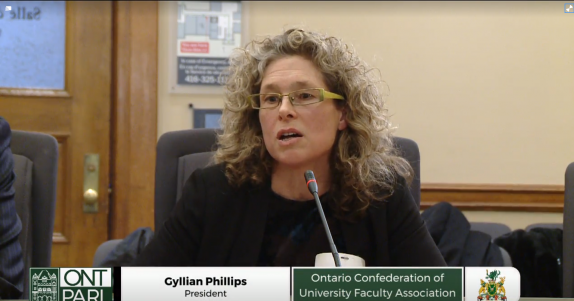
OCUFA has set out its priorities for the 2019 Ontario Budget in a written submission to the Standing Committee on Finance and Economic Affairs.
Strengthening Ontario’s universities through meaningful investment in university education is essential to support high-quality accessible education for Ontario students, continued strength in research, and fairness for contract faculty.
As part of the consultation process, OCUFA President Gyllian Phillips presented the priorities of Ontario’s faculty and academic librarians to the Standing Committee on Finance and Economic Affairs on January 29 in Toronto.
OCUFA is recommending that the Government of Ontario:
1. Increase per-student public investment in Ontario’s universities to improve Ontario’s rank among other provinces in per-student funding by 2020-21.
The state of funding for Ontario’s universities is not on the right track. Since 2008, per-student funding in Ontario has been declining and trailing the rest of Canada by a substantial margin. It is time to break from years of stagnated funding and invest meaningfully in postsecondary education. A sensible plan that begins with investments to enhance Ontario’s per-student funding would put Ontario universities in a stronger position to provide the accessible, high-quality education our students deserve and that our economy needs.
2. Offset the cost associated with reducing tuition fees through an increase to university operating grants.
Tuition fees are a barrier to access that prevent students from pursuing a postsecondary education and OCUFA supports the call from Ontario’s students’ unions that tuition fees should be reduced and replaced with increased public funding for universities. The government’s recent decision to cut tuition fees by 10 per cent in 2019-20 and freeze fees in 2020-21 is a welcome step, but it must be matched with an increase in core public funding to ensure university budgets are not reduced.
3. Ensure that the university funding model does not link performance metrics to funding.
The government’s planned shift towards performance-based funding will create inequities and slowly but certainly undermine the integrity of Ontario’s postsecondary education system. By design, performance funding rewards those institutions that meet specific performance targets and penalizes institutions that do not by withholding the resources they need for improvement. Rather than employing this unnecessarily risky and destabilizing approach, available data should be leveraged to improve policymaking decisions and outcomes.
4. Make meaningful consultation with faculty a requirement in the third round of Strategic Mandate Agreement negotiations.
Strategic Mandate Agreement (SMA) negotiations must include adequate consultation with the university community and incorporate faculty input into the SMAs. While it is the responsibility of local university administrations to undertake local consultations, the government must take a leadership role and set enforceable standards for the negotiation processes. This will ensure the SMAs reflect the perspectives, experiences, and priorities of the entire campus community – not just administrators.
5. Launch a faculty renewal strategy for Ontario universities that achieves the dual goals of supporting new full-time tenure-stream hiring and creating pathways for contract faculty to more secure positions.
Every student’s learning experience and every university’s capacity to produce research relies on the faculty members who teach, research, and engage in their communities; but the growing gap between enrolment and faculty hiring is putting a strain on the system. By investing in accessible postsecondary, this year’s budget can start Ontario on a path that prioritizes quality education for students, innovative research, and fairness for the province’s contract faculty.
Universities are vital institutions within our communities, delivering education to thousands of students, producing thought-provoking and ground-breaking research, and providing good jobs that support local economies. Government commitment to robust public funding for postsecondary education is essential for sustaining the capacity needed to ensure these contributions in the future.





I fully support OCUFA’s recommendation to the Standing Committee on Finance and Economic Affairs. A decrease in funding to post-secondary institutions will have a negative impact on the quality of education needed to make Ontario competitive and make Ontario less “open for business”!